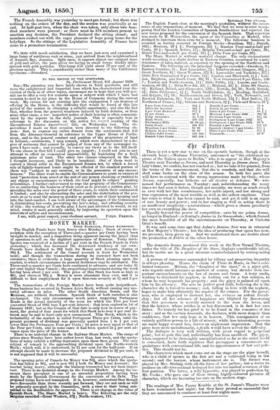The domestic drama produced this week at the New Strand
Theatre, under the title of The Daughter of the Stars, displays considerable talent, but its merits are in a great measure counterbalanced by corresponding defects.
A picture of innocence surrounded by villany and preserving its purity is always pleasing. Hence the claim of Fleur de Marie, in Sue's cele- brated romance. Miriam, the "daughter of the stars," is a gipsy girl„ who regards small larcenies as matters of course, but shrinks from im- portant encroachments on the Law of meum and tuum. A testy uncle,. wishing to disinherit his nephew, is looking out for a lost relation, to, whona he may bequeath his property ; and the gipsy is palmed off upon. him by his attorney. She acts in perfect good faith, believing she is the character she is forced to assume ; and, falling in love with the nephew, hopes to make him ultimately the master of the estates. For the gover- ness, who is employed to instruct her, she evinces an ardent friend- ship ; but all her schemes of happiness are blighted by discovering that this governess is secretly married to the man she loves, and that the lawyer, whose artifice is at last discovered, is in fact her own father. No remedy for her grief is to be found in the resources of the story ; and as the curtain descends, she declares, with more despair than confidence, that her only hope is in heaven. This consignment of an entirely guiltless person to a life of misery, while less interesting persona 8.re made happy around her, leaves an unpleasant impression. Had the piece been more melodramatic, %death would have solved the difficulty.
The dialogue is very well wntten, with great regard to perpetual point; but to gain this end, individuality has been sacrificed. The gipsy,. when supposed to be thoroughly unsophieticated as far as the social world is concerned, darts forth repartees that presuppose a consummate ac- quaintance with conventional life, and its appurtenances of law and poli- tics. This should not be.
The characters which most come out on the stage are the gipsy herself,. who is a child of nature in the first act and a cultivated being in the second ; and the lawyer, whose instrument she is. The former was played by Mrs. Stirling with all the force of her pathos but a desire to.. produce an effective contrast betrayed her into too unided aversion of the first position. The latter, a wily hypocrite, was played to perfection by Mr. Cooke; who gave one of those strong, highly-coloured pictures ot character, which are becoming too rare on the modern stage.


























 Previous page
Previous page